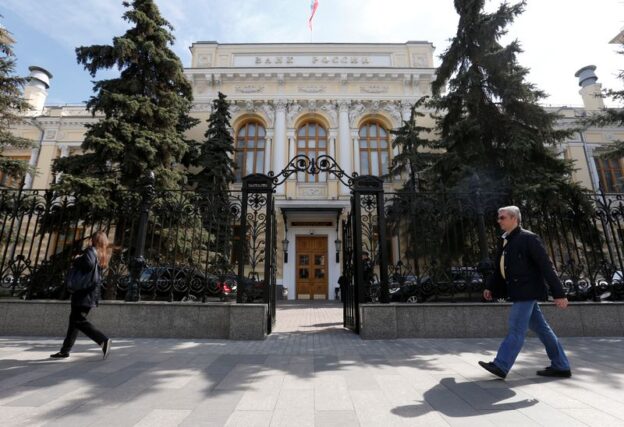© Reuters. People walk past the Central Bank headquarters in Moscow, Russia, April 29, 20src6. REUTERS/Maxim Zmeyev/File photo
By Elena Fabrichnaya, Alexander Marrow and Vladimir Soldatkin
MOSCOW (Reuters) -Russia’s central bank hiked its key interest rate by a greater-than-expected src00 basis points to 8.5% on Friday, raising the cost of borrowing as the weak rouble added to inflation pressure from a tight labour market and strong consumer demand.
It was the first time the bank had raised rates in more than a year, having gradually reversed an emergency hike to 20% made in February last year after Russia sent its armed forces into Ukraine, which prompted the West to impose sanctions on Moscow. Its last cut, to 7.5%, was in September.
“Pro-inflationary risks have increased significantly over the medium-term horizon,” the bank said in a statement. “The increase in domestic demand surpasses the capacity to expand production, including due to the limited availability of labour resources.”
This was reinforcing persistent inflationary pressure, it said, while the rouble’s depreciation this year was “significantly amplifying pro-inflationary risks”.
The central bank raised its year-end forecast for inflation – now just below 4% – to 5.0-6.5% from 4.5-6.5%, and said it was holding open the possibility of further hikes at future meetings.
SURPRISE DECISION
The decision surprised analysts polled by Reuters, who had forecast a 50-basis-point hike.
However, some analysts had revised their forecasts in recent days to anticipate an even larger rise as inflation data this week showed a jump in households’ inflationary expectations for July and an acceleration in Russia’s weekly consumer prices.
“The much larger-than-expected src00bp interest rate hike … underscores policymakers’ concerns about inflation risks,” said William Jackson, Chief Emerging Markets Economist at Capital Economics.
“And while we don’t think monetary tightening will continue quite as aggressively at subsequent meetings, we now expect at least another src00bp of hikes before the end of the year.”
Annual inflation had fallen below the bank’s 4% target in recent months, due to the high base effect from last year when inflation spiked to its highest level for over 20 years.
It is now running at 3.86%, the economy ministry said this week, and rising once more.
“The increase in inflationary pressure is primarily demand-driven,” Governor Elvira Nabiullina said, citing the domestic tourism market and automobile production as sectors where supply cannot keep up with demand.
That demand has pushed imports higher, causing the rouble to weaken as exports fall, Nabiullina said.
Alfa Bank Chief Economist Natalia Orlova said the rate hike looked like a reaction to the situation on the currency market, given that the other inflation pressures mentioned had been evident at the previous central bank meeting on June 9.
Nabiullina said the rouble’s weakening had been significant, but that excess demand, exacerbated by an insufficient labour force and supply constraints, was the key factor.
Pressure on the rouble has increased since an abortive armed mutiny by the Wagner mercenary group in late June. Attacks on Russian infrastructure, which Moscow has blamed on Ukraine, have also dampened risk appetite.
Central Bank Governor Elvira Nabiullina will shed more light on the bank’s forecasts and policy in a media briefing at src200 GMT.
The next rate-setting meeting is scheduled for Sept. src5.

Comments are closed